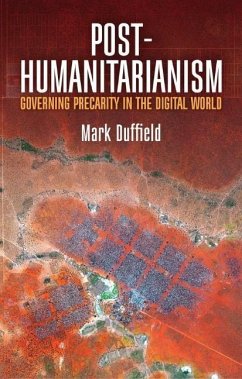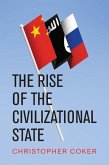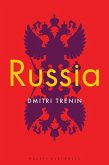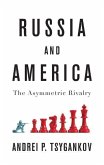The world has entered an unprecedented period of uncertainty and political instability. Faced with the challenge of knowing and acting within such a world, the spread of computers and connectivity, and the arrival of new digital sense-making tools, are widely celebrated as helpful. But is this really the case, or have we lost more than gained in the digital revolution?
In Post-Humanitarianism, renowned scholar of development, security and global governance Mark Duffield offers an alternative interpretation. He contends that connectivity embodies new forms of behavioural incorporation, cognitive subordination and automated management that are themselves inseparable from the emergence of precarity as a global phenomenon. Rather than protect against disasters, we are encouraged to accept them as necessary for strengthening resilience. At a time of permanent emergency, humanitarian disasters function as sites for trialling and anticipating the modes of social automation and remote management necessary to govern the precarity that increasingly embraces us all.
Post-Humanitarianism critically explores how increasing connectivity is inseparable from growing societal polarization, anger and political push-back. It will be essential reading for students of international and social critique, together with anyone concerned about our deepening alienation from the world.
In Post-Humanitarianism, renowned scholar of development, security and global governance Mark Duffield offers an alternative interpretation. He contends that connectivity embodies new forms of behavioural incorporation, cognitive subordination and automated management that are themselves inseparable from the emergence of precarity as a global phenomenon. Rather than protect against disasters, we are encouraged to accept them as necessary for strengthening resilience. At a time of permanent emergency, humanitarian disasters function as sites for trialling and anticipating the modes of social automation and remote management necessary to govern the precarity that increasingly embraces us all.
Post-Humanitarianism critically explores how increasing connectivity is inseparable from growing societal polarization, anger and political push-back. It will be essential reading for students of international and social critique, together with anyone concerned about our deepening alienation from the world.
"Mark Duffield's Post-Humanitarianism Illustrates how the world of humanitarian emergency provided a practical stage for new forms of knowledge and governing agency, now being generalised across the globe. Brimming with empirical insight and innovative conceptual framings, this book will be a must read for students, academics and practitioners interested in contemporary transformations in development, security and governance and in the need for a critical alternative."
David Chandler, University of Westminster
"In his latest book Mark Duffield combines compelling theoretical insights and practical experience of humanitarian work in Sudan to paint a rather sombre picture of a post-humanitarian world governed increasingly by computers and algorithms. Disasters have long shaped North-South relations, but humanitarianism has become pessimistic towards human agency and its transformative potential to build modern infrastructure protecting people from disasters. The humanitarian sector has adopted post-humanist thinking alienated from human hopes and understanding. Duffield explores 'post-humanitarianism' as 'the international face of post-humanism'. Post-humanitarian alienation shapes the new field of digital humanitarianism and is complicit with a technological barbarism seeking to use digital technology to manage disaster-affected populations and dis-affected people living in precarious conditions. Yet Duffield's book bursts with optimism about humanity's potential to build a better world. His underlying argument is that technocratic cybernetic approaches are not fit for political problems. Only conscious collective human agency and popular accountability may help found a humane world."
Vanessa Pupavac, University of Nottingham
David Chandler, University of Westminster
"In his latest book Mark Duffield combines compelling theoretical insights and practical experience of humanitarian work in Sudan to paint a rather sombre picture of a post-humanitarian world governed increasingly by computers and algorithms. Disasters have long shaped North-South relations, but humanitarianism has become pessimistic towards human agency and its transformative potential to build modern infrastructure protecting people from disasters. The humanitarian sector has adopted post-humanist thinking alienated from human hopes and understanding. Duffield explores 'post-humanitarianism' as 'the international face of post-humanism'. Post-humanitarian alienation shapes the new field of digital humanitarianism and is complicit with a technological barbarism seeking to use digital technology to manage disaster-affected populations and dis-affected people living in precarious conditions. Yet Duffield's book bursts with optimism about humanity's potential to build a better world. His underlying argument is that technocratic cybernetic approaches are not fit for political problems. Only conscious collective human agency and popular accountability may help found a humane world."
Vanessa Pupavac, University of Nottingham








